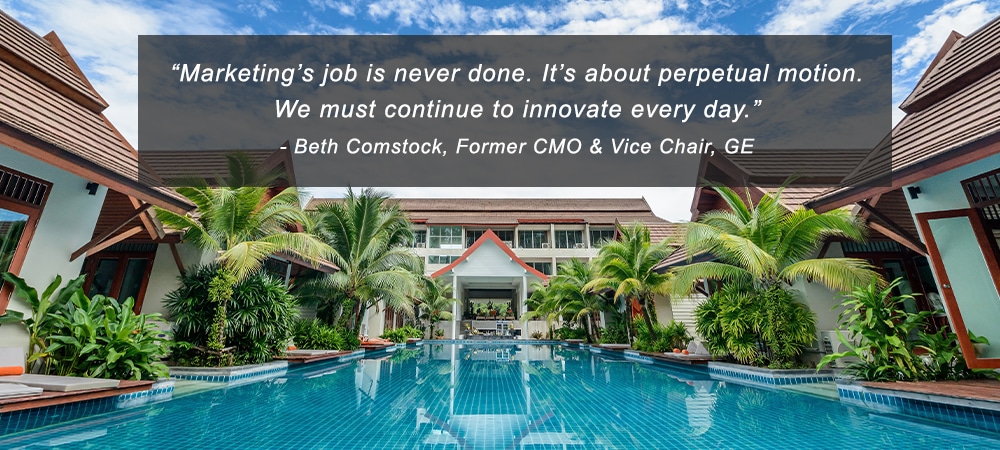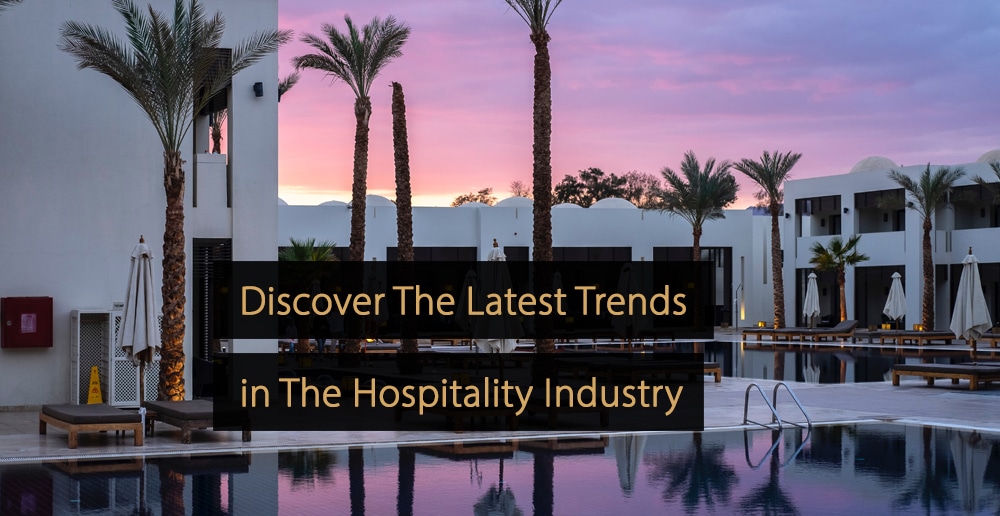Hotel marketing is key in helping you attract bookings and optimize revenue. For the most part, your marketing messages are how customers will become aware of your hotel and also how they will understand your values and unique selling proposition. Of course, to optimize your marketing, you need to be aware of the latest hotel marketing trends for 2026. In this article, you can learn about the more general trends within hotel marketing and those that have emerged as a result of the coronavirus.
Table of Contents:
- What is Hotel Marketing?
- Why is Hotel Marketing Important?
- 24 Hotel Marketing Trends for 2026
- 1. Collect First-Party Data
- 2. Highlight Safety in Hotel Marketing & Guest Communication
- 3. Sustainability and “Going Green”
- 4. Mobile Check-In for Hotel Guests
- 5. Accepting Contactless Payments
- 6. Promoting Destination Experiences
- 7. The Role of Flexible Cancellations
- 8. Video Marketing
- 9. Produce Short-Form Video Content
- 10. Artificial Intelligence (AI)
- 11. Customer Experience Marketing
- 12. Make Use of Direct Messaging
- 13. Voice Search
- 14. Hotel Chatbots
- 15. Augmented Reality
- 16. Let Potential Guests Experience Your Hotel From Afar
- 17. Influencer Marketing
- 18. User-Generated Content
- 19. Personalization Marketing
- 20. Remarketing
- 21. Using Virtual Reality Technology
- 22. Effective Social Media Marketing
- 23. Metaverse: An Innovative Hotel Marketing Trend
- 24. Non-Fungible Tokens as an Extension of Digital Hotel Marketing
- Want to Learn More About Hotel Marketing Strategies?
What Is Hotel Marketing?
Hotel marketing is an umbrella term that refers to hotels’ various strategies and techniques to promote their business and make a positive impression on customers. Essentially, it is about making a hotel as appealing as possible to attract as many guests as possible.
In the digital age, hotel marketing occurs online and in person, and hotel brands need to maximize their presence through website traffic, social media, email, and various other channels.
Why Is Hotel Marketing Important?
Within the hotel and hospitality industry, competition is one of the biggest challenges for individual hotels to contend with. Hotel marketing is essential, as it is how hotels can promote their property, highlight their unique features, ensure they stand out from rivals, and establish the benefits of staying there.
According to Grand View Research, the global market for hotels, resorts, and cruise lines was valued at approximately USD 850 billion in 2024 and is projected to grow at a compound annual growth rate (CAGR) of 18.8% through 2030. This explosive growth forecasts broader shifts in the industry, where technology adoption, shifting traveler behavior, and rising guest expectations are rewriting the rules of engagement.
Ultimately, keeping up with the latest hotel marketing trends and engaging customers through marketing can help hotel owners maximize the number of bookings they generate and the revenue they bring in.
24 Hotel Marketing Trends for 2026
Below, you will find a breakdown of some key trends associated with hotel marketing. For your convenience, these trends are both general trends and trends that are connected to the coronavirus and the associated changes in consumer behavior.
1. Collect First-Party Data
Within hotels, first-party data can come from many sources, including your website analytics, booking engine, and direct communication with customers across multiple channels. The data itself can also take many forms, from demographic data to behavioral data, performance data, customer feedback, and conversational data.
You must collect and utilize first-party data to get the most from your hotel marketing efforts. This means designing your business operations around collecting valuable information. For instance, you need to ask the right questions during conversations, you need your booking engine to extract the most important pre-arrival data, and so forth. The more valuable first-party data you gather, the more you can use it to enhance your marketing efforts.
According to Sojern and Benchmark Research Partners’ survey, nearly 61% of hotel brands have implemented a first-party data strategy, and of them, 81% reported an increase in revenue after implementing the strategy. This success stems from enhanced personalization capabilities and improved targeting accuracy when hotels own their customer data relationships.
Video: What is First-Party Data?
2. Highlight Safety in Hotel Marketing & Guest Communication
One of the biggest trends within hotel marketing is the increased need to highlight safety measures and hygiene within your marketing content and guest communications. Travelers need reassurance that they are keeping their property up to hygiene standards. According to the American Hotel & Lodging Association (AHLA) State of the Industry Report, 81% of travelers say they feel more comfortable staying at hotels that have implemented enhanced safety protocols and standards.
When making booking decisions, hygiene measures and safety policies are on customers’ minds. How well you communicate your steps can easily differentiate between generating sales and failing to do so. Your efforts must be communicated on your website, third-party platforms, emails, and elsewhere. Look at “Hygiene is the New Marketing Message for Hotels” for further insights.
Chip Rogers, President and CEO of the American Hotel & Lodging Association, states:
“The hotel industry is united to enhance our already rigorous cleaning protocols for the health and safety of our guests, and it’s working. It’s more important than ever that guests follow our Safe Stay Guest Checklist so they understand what is expected of them, no matter where they stay. Travelers across the country looking to include a hotel stay in their upcoming vacation plans know that with the implementation of Safe Stay, hotels will be safer and cleaner than ever before.”
3. Sustainability and “Going Green“
Sustainability is the practice of embracing eco-friendly or “green” strategies to look out for the long-term viability of the industry and Earth itself. A growing number of hotels are highlighting their green credentials in hotel marketing. The concept of “going green” is important for the future of the planet, but also for hotel guests, who are increasingly conscious of environmental issues. Behaving sustainably can be a valuable competitive differentiator. A long-term study by Cornell University analyzing nearly 1,200 hotels found that green-certified properties generate 6% more monthly revenue and report 4.25% higher guest satisfaction scores compared to non-certified competitors.
Hotels can take many different steps to improve their green credentials, from using energy-efficient lighting and heating systems to avoiding single-use plastics or sourcing ingredients locally. Highlighting these features in your hotel marketing efforts can attract guests who may have concerns about the environment. It can also make your hotel more appealing to business travelers working for eco-conscious brands.
For example, Hilton’s “Travel with Purpose” program aims to cut environmental impact in half and double social investment by 2030. Their internal research shows that 33% of travelers consider a hotel’s sustainability practices before booking, and among Gen Z guests, that figure jumps to 44%.

Nicole Sideris, Founder & Principal Consultant, X Hospitality“Implementing eco-conscious practices such as recycling may not even be followed by hotel staff, let alone by guests. Consumers are often wary of how much of the practice has really been adopted. Hotels need to live and breathe it, do case studies on their initiatives, and include it in blogs to help boost coverage.” Click here to learn how hotels can integrate sustainability practices in their hotel marketing strategies from our Expert Panel. |
4. Mobile Check-In for Hotel Guests
Mobile check-in options allow your guests to check in using a smartphone app, rather than going through the traditional front desk process. When guests arrive, they can be allocated a room and select preferences. Promoting your mobile check-in service through hotel marketing is valuable for attracting customers who prioritize convenience. The process itself can speed up check-ins and reduce workloads for staff. According to Oracle research, travelers prefer contactless services for check-in (53.6%) and check-out (49.1%) processes, signaling strong demand for mobile solutions.
In addition to highlighting your mobile check-in options, you can integrate this technology with your app and increase downloads. This could allow you to target customers with tailored marketing messages right before they arrive. Your mobile check-in service can also be connected to a customer loyalty program to provide rewards.
Leading hotel brands are embracing this smart technology. Hilton, for instance, reports that more than 80% of its global properties now support digital check-in and key access via the Hilton Honors app. As of 2024, guests have used Hilton’s Digital Key technology to open over 150 million doors, eliminating the need for plastic keycards and preventing approximately 140 tons of plastic waste.
Video: Touchless Check-In at Hilton Norfolk THE MAIN
5. Accepting Contactless Payments
Contactless payments are any form of payment that can be used without swiping a card, inserting a card into a card reader, or using cash. This includes contactless debit and credit cards, mobile wallets, and some cryptocurrencies. Providing support for contactless payments is important for efficiency and customer choice. Highlighting the ways people can pay within your hotel marketing content can potentially encourage bookings.
According to Mastercard’s Global Consumer Study, over 68% of consumers now prefer using digital payments instead of cash. In hospitality specifically, Oracle Hospitality’s joint study with Skift revealed that 49% of travelers consider digital payment options a top technology priority, while 34% of hoteliers are actively investing in these tools to meet evolving expectations.
The most essential contactless payment options to accept include contactless cards, Apple Pay, and Google Pay. Other options you may wish to consider include PayPal and popular cryptocurrencies. Try to accept these same methods at the front desk, bar, hotel restaurant, and other major points of sale.
6. Promoting Destination Experiences
Hotel marketing does not need to be focused on your hotel alone. One of the biggest marketing trends involves promoting experiences that travelers can enjoy if they visit your location. Destination experiences are an important part of hotel marketing because they provide a tangible reason to stay at your hotel. You can draw attention to key things guests can get up to during their stay.
Consider partnering with local tour operators or with nearby attractions, and make it easy for your guests to buy tickets and arrange transportation. Think outside the box and go beyond the obvious tourist traps. Why not help to connect guests with cocktail-making classes, unique historical interest tours, or a nearby karaoke bar? By promoting destination experiences, you can sell your hotel as the place to book to make happy memories.
For example, several hotels in North America are preparing “Follow Your Team” packages for FIFA 2026, combining match tickets with city tours, fan meet-ups, and exclusive events. These hybrid offerings don’t just fill rooms; they create emotional value and deepen guest engagement.
Video: Destination Marketing Case Study: A transformational experience from Australia
7. The Role of Flexible Cancellations
Concerning customer service, one of the essential things those in the hotel industry need to remember is that COVID-19 created a lot of uncertainty. Customers could easily face the sudden imposition of new restrictions, resulting in a loss of money with non-refundable bookings. This sentiment is still visible after the height of the pandemic, as flexible and refundable bookings are much more attractive.
Industry data shows that hotels have increased the average booking window to 32 days, which provides guests with more time to research and more concern about what might change between booking and travel. Demonstrating an understanding through a flexible cancellation policy can go a long way towards encouraging bookings in the first place and can also help you avoid negative press.
Although some hoteliers worry about the risk of last-minute cancellations, the data is reassuring. Industry research revealed that cancellations are now below 20%, a major drop from pandemic highs. More importantly, over 50% of travelers say they’re willing to pay more for the peace of mind that comes with free cancellation. Nearly 1 in 5 guests even said they’d pay $50 or more for that option.
Table: Reasons for Flexible Cancellation Implementation
| Flexible Cancellation Aspect | Benefit | Risk for Hotel |
|---|---|---|
| Customer Satisfaction | Increased guest loyalty and positive reviews. | Potential revenue loss due to last-minute cancellations. |
| Adaptation to External Factors | Mitigation of negative impact during crises like the COVID-19 pandemic. | Financial strain during unforeseen circumstances. |
| Competitive Edge | Attraction of travelers who prioritize flexibility. | Pressure to match or exceed competitors’ cancellation policies. |
8. Video Marketing
Video marketing is one of the most powerful hotel marketing strategies, helping to target marketing messages toward potential customers in a way that is convenient to them. In fact, according to the Video Marketing Statistics by Wyzowl, 91% of marketers are using video as a marketing tool in 2024. Video content is especially popular on social media platforms, and it can combine visual and audio elements.
The range of options available to marketers is almost endless, from live streams of hotel activities to promotional videos highlighting hotel features and interviews with customers sharing their experiences. The growing prevalence of 360-degree video also opens up greater opportunities to fully immerse audiences.
This trend is especially strong on platforms like TikTok and Instagram Reels. According to Forbes, 67% of Gen Z users use Instagram for search, while 62% turn to TikTok, surpassing even Google. That means video isn’t just entertainment, it is a marketing channel.
For example, Marriott uses Reels and TikTok to showcase destinations, room features, and seasonal promotions. These videos often receive thousands of views and comments, helping to build brand awareness and drive bookings.
Video: Example W Hotel Barcelona Promotional Trailer
9. Produce Short-Form Video Content
The short-form video has taken the internet by storm in recent years, especially thanks to platforms like TikTok and features like YouTube Shorts and Instagram Stories. Short-form video content has a lot of advantages over long-form content, including requiring little in the way of time investment and attention span from viewers.
According to Proactive Hospitality Solutions, 73% of consumers prefer learning about products and services, including hotels, through short-form videos rather than text. In 2026, U.S. adults are expected to spend an average of 48 minutes per day on short-form video platforms, with TikTok users averaging nearly an hour daily.
Even better, short-form video has high viral potential. According to Hubspot, nearly half of marketers (47%) say short videos are more likely to go viral, which means a well-crafted post could reach thousands, or even millions, of viewers.
Within hotel marketing, short-form videos can often achieve what would take hundreds or even thousands of written words to achieve. You can use short-form videos to highlight your hotel’s main features, showcase your employees’ work, demonstrate some of your brand values, or attract attention through viral marketing.
Example: Cinematic Hotel Video
10. Artificial Intelligence (AI)
Customer service interactions form a major part of the modern hotel marketing mix, and artificial intelligence can play an important role here. For example, AI-powered chatbots are one of the best ways to ensure customers receive quick responses via live chat functions on hotel websites 24 hours a day, eliminating slow response times.
However, artificial intelligence within the hospitality sector extends far beyond this. For example, AI can help hotels to segregate customers more effectively, assisting with personalized marketing efforts. It can also speed up data analytics, while AI-driven customer service robots can be deployed in hotels.
According to the Accenture survey, 87% of travelers want AI tools to give them reliable, specific travel advice, and 82% are open to suggestions they hadn’t thought of. Meanwhile, Hotel Tech Report found that 58% of guests believe AI improves their experience, especially during booking and check-in.
As Tomeu Fiol, Global Hotel Technologies Director, says:
“Two technologies are revolutionizing the hotel industry”. “Artificial intelligence (AI) and robotics. While AI grabs the spotlight, robotics, which receives less attention will have an undeniable impact.
Video: Artificial Intelligence in Hotel Rooms
11. Customer Experience Marketing
Customer experience marketing refers to a collection of hotel marketing strategies that are based on the experience customers have when staying at a hotel or interacting with a business. It is based on the idea that hotel customers do not pay for products or services; they pay for experiences.
According to a Skift and Oracle Hospitality report, 73% of hotel guests prefer properties that offer self-service technology and smart room features, like mobile check-in, smart TVs, or app-controlled lighting. These tools enhance comfort and convenience, which are key parts of the guest experience.
Also, the TripAdvisor Experience of Travel Study found that 67% of global travelers now prioritize unique experiences over material things when planning trips. This means guests are looking for stays that feel personal and meaningful.
Hotels can improve the customer experience in several ways, such as by delivering excellent customer service, offering unique features in hotel rooms, and providing a superior range of facilities for guests. By focusing on marketing efforts on the experience, hotels can tap into why people stay in hotels in the first place. Hotels that focus on creating outstanding guest satisfaction can increase occupancy by up to 20% according to McKinsey & Company research.
Video: Example Fairmont Hotels – Luxury Customer Experience
Find more detailed information about customer experience in the hotel industry in the article “Use Cases of Facial Recognition in The Hospitality Industry”.
12. Make Use of Direct Messaging
A hotel marketing concept that marketers are only starting to come to terms with is how to use direct messaging effectively. This can occur across a number of platforms, including online chat, mobile text messages, and mobile messaging apps, as well as direct message tools on social media platforms like Facebook and Instagram.
One of the most important skills for modern hotel marketers to learn is how to use direct messaging effectively. It will often require a combination of marketing and classic customer service, as you will need to respond to questions, provide advice, and respond to complaints, but do so in a way that helps to build brand awareness and familiarity.
Statista reports that over 62% of global searches happen on mobile devices, and the travel and hospitality sector leads all industries in mobile ad click-through rates at 5.36%. This shows how important mobile-friendly communication has become.
13. Voice Search
In recent years, voice search has emerged as one of the most essential hotel marketing trends, and several hotel marketing strategies can take advantage of this. For instance, using smart home devices allows customers to book hotels entirely through voice commands, and hotels should capitalize on this.
Additionally, voice search possibilities can be implemented within hotel rooms and promoted to attract customers. This can be achieved by including smart speakers or smart hubs in hotel rooms, allowing guests to use them to obtain the latest tourist information or to book hotel services from the comfort of their rooms.
According to Think with Google, 27% of the global online population uses voice search on mobile. In addition, STR reports that hotels using voice search strategies experience a 27% higher mobile booking completion rate, showing how voice can directly support conversions. Adopting voice technology helps hotels improve visibility, streamline guest services, and stay ahead in a digital-first travel market.
Video: Book Travel Products via Voice Search
Find more detailed information and examples about how voice search can benefit your business in the article “How Can Voice Control Benefit the Hospitality Industry?”.
14. Hotel Chatbots
Customers tend to have high expectations regarding online customer service, anticipating swift replies to questions, and this is where chatbots can be of great value. According to the Chatbot Market Report by Markets and Markets, the global chatbot market size is projected to reach $15.5 billion by 2028.
A chatbot can be set up to answer common questions, push your key marketing messages, increase direct bookings, and even guide customers through bookings. Chatbots’ main benefits include the ability to respond to customers even when staff are unavailable and automatic language detection and communication in multiple languages. Chatbots can continue to communicate with guests throughout the customer journey, including in the follow-up phase.
According to Hotel Tech Report, 70% of hotel guests find chatbots useful, especially for tasks like requesting wake-up calls, Wi-Fi passwords, checking hotel facility operating hours, and more. The trend is gaining traction across the industry. A Statista and Skift survey found that nearly 50% of travelers are open to staying at hotels that use chatbots or automated messaging for customer service.

Alessandro Inversini, Associate Professor of Marketing and Director of the Institute of Customer Experience Management, Ecole hôtelière de Lausanne“Chatbots are an interesting tool as long as they are properly designed and powered by a good AI engine. I think they can be useful as a first point of contact, but now customers will be more selective and therefore need more ‘high touch’ and relationship building. I think that rather than investing in chatbots, hotels should invest their efforts in relationship building after the pandemic to show that they genuinely care for the customers. This is what people who have experienced the difficulties of pandemic lockdowns and the challenges of restrictions will now expect as they return to travel.” Click here to learn how hotel chatbots contribute to guest experiences from our Expert Panel. |
Video: Book a Hotel Room With Chatbot
Learn more by reading the articles “Reasons Why Every Hotel Needs a Hotel Chatbot” and “What Are the Important Features When Choosing a Hotel Bot?”.
15. Augmented Reality
Augmented reality is somewhat similar to virtual reality technology. Still, rather than entirely altering a user’s surroundings, it works by overlaying information onto real-world environments, usually through a smartphone or tablet. The technology itself became mainstream through popular apps like Pokémon Go. According to Grand View Research, the global augmented reality market size was estimated at USD 83.65 billion in 2024 and is expected to grow at a CAGR of 37.9% from 2025 to 2030.
Today, augmented reality marketing is one of the most significant hotel marketing trends. In particular, promoting AR features can help a hotel to stand out from rivals. An example of its uses would be the inclusion of interactive wall maps in rooms, which can provide users with tourist information when they aim a smartphone at them.
Video: Example Augmented Reality for Tourism
Find more detailed information and examples about how augmented reality can benefit your business in the article “How Augmented Reality is Transforming the Hospitality Industry.”
16. Let Potential Guests Experience Your Hotel From Afar
What if there was a hotel technology you could turn to to help potential guests make their booking decisions? Virtual reality tours offer precisely this. Potential guests and B2B clients can experience your hotel from afar using VR technology.
This can be particularly effective during the booking process, which is why VR tours are increasingly integrated into booking engines. With those interested in your business or event options, VR means they can also see your wedding, event, or dinner facilities and book without requiring an in-person inspection first.
A Google Travel study found that listings with virtual tours and rich media content generate 2x more interest than those without. For instance, Marriott’s Meetings Imagined platform uses 360° walkthroughs to showcase meeting spaces, helping attract global corporate clients and streamline event planning.
Read “Reasons Why Every Hotel Should Have a Virtual Reality Video” for additional information. It is also worth noting that modern VR tours tend to be web-based and easily accessible through popular web browsers.
17. Influencer Hotel Marketing
Influencer marketing refers to reaching out to individuals with a significant online presence and using their influence to get marketing messages out to a particular audience. Influencers tend to have established audiences, which may consist of a specific demographic, and their audience will usually respect their views.
In some ways, influencer marketing is similar to celebrity endorsements, with the audience trusting a business or brand because of its association with someone they trust or admire. Hotels might partner with influencers to create video content, social media posts, written content, or other forms of online marketing.
According to Statista, the global influencer marketing industry was valued at $17.4 billion in 2023 and is expected to surpass $30 billion by 2025, showing how quickly the space is growing. A report from Expedia Group found that over 70% of travelers said an influencer’s recommendation directly impacted their decision to book, and nearly 75% would consider buying a travel package based on influencer content alone.
Four Seasons Hotels is a leading example. The hotel regularly collaborates with luxury travel influencers to create aspirational content. Their innovative “Envoy” initiative welcomed not just influencers but all creative voices, from poets to dancers, to tell stories about their properties, proving that powerful storytelling can come from anywhere.
Video: How Instagram Influencers are Driving Tourism
18. User-Generated Content
In the hotel industry, user-generated content refers to online content created and shared by customers. Examples range from customer reviews and video blogs to hotel photos or holiday snaps. User-generated content is most commonly shared on social media or via personal blogs. Unlike traditional ads, UGC feels honest and personal. According to Nielsen’s Global Trust in Advertising Report, 92% of consumers trust recommendations from friends, family, or other users more than branded advertising
This kind of content has the benefit of coming from real customers rather than from a brand, increasing audience trust. For hotel marketing strategies to truly harness the power of user-generated content, they must provide opportunities for it to be easily created and shared, with digital photo booths as one example.
For instance, Hilton Hotels promotes its #HiltonForTheStay hashtag for encouraging guests to share authentic moments during their visit. Another example is Loews Hotels, which launched its “Travel for Real” campaign by using real guest photos across its website and social media. By gathering over 38,000 user-submitted images, the campaign significantly generated social media engagement and made their marketing feel more relatable and genuine.
Video: Example User-Generated Content for Hotels
19. Personalization in Hotel Marketing
Personalization marketing aims to deliver more targeted promotional content to individual users. It is a technique that relies heavily on the collection of user data. According to a McKinsey report, 71% of consumers expect companies to deliver personalized experiences, and 61% of consumers are willing to spend more for personalized experiences. The primary advantage of personalization marketing is that the promotional content that customers see is more relevant to them as individuals.
Personalization marketing can take several forms, including intelligent product recommendations delivered online or personalized email marketing campaigns. Content can be tailored by obtaining personal contact details and targeted toward specific users based on their web browsing habits and social media activity.
Experian research shows personalized hotel emails generate six times higher transaction rates than generic campaigns. Hotels using guest data for customized subject lines achieve 26% higher open rates, while targeted content based on booking history significantly improves conversion performance.
Video: Personalisation Marketing Explained by Dell
Find more detailed information and examples of personalization marketing in the article “5 Ways Personalization Marketing Can Benefit the Hospitality Industry”.
20. Remarketing
Remarketing is a way for those in hotel management to reach out to users who have already visited their hotel website or interacted with their brand on social media. It can be especially beneficial to hotels because research indicates many people begin to make a hotel booking before stopping. This could be because they have become distracted or want to conduct further research.
According to Google research, travelers can have over 400 digital moments during their booking journey, with some guests performing over 530 searches before making a decision. Therefore, it is essential for hotels to stay visible throughout the decision process.
Remarketing allows these users to be targeted with specific marketing messages, such as an image of the exact hotel room they were booking, reminding them of their interaction. A major advantage of remarketing over other digital advertising is that hotels already know these users have shown some interest.
The average hotel website conversion rate typically falls between 1.5% and 2.5%. This means that for every 100 visitors to a hotel’s website, only 1.5 to 2.5 will complete a booking. Remarketing becomes crucial for recapturing the 98% of visitors who leave without booking.
Video: What is Remarketing?
21. Using Virtual Reality Technology
Virtual reality technology provides users with realistic digital environments to explore. Examples of common hotel marketing uses include VR 360-degree tours of parts of your hotel and VR experiences of nearby attractions. Embracing virtual reality within your marketing helps to immerse potential guests in the discovery phase and booking process. It can help them make a decision and also position your hotel as a tech-savvy brand. According to the Statista/Skift Survey, almost 34 percent of global respondents said that they were very interested in using a virtual reality/metaverse experience to tour a hotel (rooms, events venue, conference rooms, etc.) before booking.
By providing realistic and immersive tours of your hotel lobby, guest rooms, and other key facilities, you can highlight exactly what your hotel has to offer and allow your target audience to experience it for themselves before they book. VR technology can also be promoted in your marketing content to business guests. Some hotels are experimenting with options that allow businesses to use VR headsets and conduct meetings in the metaverse.
22. Effective Social Media Marketing
Social media platforms provide a range of hotel marketing opportunities, and it is important to capitalize on them. Whether it’s the visual offerings of Instagram or a customer-facing Facebook page, you must use these platforms effectively. The value of social media lies in its ability to connect you directly with your target audience and with past and future guests. Through meaningful interactions and memorable marketing messages, you can attract more business.
According to Hospitality Net, 45% of guests say they’re more likely to book a hotel if they see a good promotion on social media. Statista predicts that social media shopping will account for 17% of all digital sales, making platforms like Instagram not just for inspiration, but also for booking.
One of the best ways to use social media is to leverage user-generated content, like photos of your hotel that have been taken by guests or reviews shared on social media channels. You can also keep guest online communication about your hotel in one place by creating and promoting a memorable and unique hashtag. User-generated content is also often considered more trustworthy than your own marketing content.
23. Metaverse: An Innovative Hotel Marketing Trend
The metaverse provides several unique hotel marketing opportunities and can help bring offerings into the modern age. According to a PwC report, the metaverse economy is expected to grow to $1.5 trillion by 2030, and the hospitality sector is already experimenting with virtual environments to attract tech-savvy guests.
Firstly, hotels can provide a virtual or digital space where people can interact freely without needing to be in the exact location. This may be especially useful for business customers hosting online meetings.
However, the metaverse can also be used in fun and creative ways that allow the customer experience to be improved more generally. For instance, interactive virtual tours of hotels can make it easier for customers to make booking decisions. At the same time, metaverse offerings can allow younger guests to experience AR and VR elements within the hotel.
For example, Millennium Hotels and Resorts launched M Social Decentraland, a hotel in a metaverse platform. It allows users to explore the virtual hotel, interact with avatars, and even book stays in the physical property. This initiative helped increase their global brand awareness significantly.
For more information about hotel metaverse opportunities, read “How Can the Hotel Industry Take Advantage of the Metaverse?”
Video: How Hotels Are Tapping into the Metaverse
24. Non-Fungible Tokens as an Extension of Digital Hotel Marketing
Non-fungible tokens, or NFTs, are among the most exciting hotel marketing options because there are so many potential uses. Essentially, NFTs are unique cryptographic assets that cannot be replicated, proving ownership of an individual digital item, such as artwork, an audio file, or even a digital membership card. Hotels are also increasingly using NFTs as loyalty tokens and digital collectibles. Statista reports that NFT-based loyalty initiatives can increase engagement and retention by up to 40%.
Generally, hotel marketers can partner with local artists or content creators and sell or give away NFTs to generate publicity. However, NFT technology could also be used to prove membership or store customer loyalty information. Beyond this, NFTs can be offered within the metaverse, allowing for exciting new digital opportunities, such as selling digital assets within a virtual space.
As Roberto Garavaglia, Innovative Payments and blockchain Strategic Advisor, states:
“The travel and hospitality industry is undergoing a transformative shift, driven by the adoption of Web3 technologies like Non-Fungible Tokens (NFTs) and Decentralized Autonomous Organizations (DAOs). NFTs, when integrated with Internet of Things (IoT) devices, offer a robust system for verifying customer reviews. This not only enhances the credibility of reviews but also provides actionable insights for service providers.”
Hotel Marketing FAQs
The hotel industry is incredibly competitive, so hotel marketing is crucial. Using the hotel marketing trends listed in this article, hotels can reach customers in different ways, with diverse marketing messages, maximizing their chances of securing bookings and achieving revenue targets.
Want to Learn More About Hotel Marketing Strategies?
Marketing plays a crucial role in helping businesses to maximize bookings and revenue. It is the main way those in the hotel industry can reach out to potential customers, conveying their unique selling proposition and brand values. In the following articles, you will find more essential marketing strategies to boost your revenue:
- Essential Hotel Marketing Strategies
- Social Media Marketing Tips to Promote Your Hotel
- The Most Important Online Distribution Channels for Hotels
- Tips to Manage Online Hotel Reviews
- Hotel Advertisement; Effective Hotel Advertising Strategies
- Hotel App: Optimise Your Guest Communication & Experience
More Tips to Grow Your Business
Revfine.com is the leading knowledge platform for the hospitality and travel industry. Professionals use our insights, strategies, and actionable tips to get inspired, optimize revenue, innovate processes, and improve customer experience.Explore expert advice on management, marketing, revenue management, operations, software, and technology in our dedicated Hotel, Hospitality, and Travel & Tourism categories.









This is very useful and inspiring information. Thanks you for sharing!
Great article! Video marketing and Instagram pictures have become highly powerful tools for marketing in hotel industry. As new technologies, like aerial drones emerge, people’s expectations regarding the quality of pictures of properties are also increasing. Also notable, is how data science is being used to attract millennials. Voice-assisted room controls and facial recognition check-in processes are only just the beginning of what the hotel industry is looking towards.
Hotel marketing has a key role to play in helping you to attract bookings and optimise revenue. For the most part, your marketing messages are how customers will become aware of your hotel and also how they will understand your values and unique selling proposition. Of course, to optimise your marketing, you need to be aware of the latest trends. However, hotel marketing trends have also changed as a result of the outbreak of COVID. In this article, you can learn about both the more general trends within hotel marketing, as well as those that are influenced by a coronavirus.
Good hotel marketing information for business starters within the hotel industry.
Very good information about hotel marketing! tnx